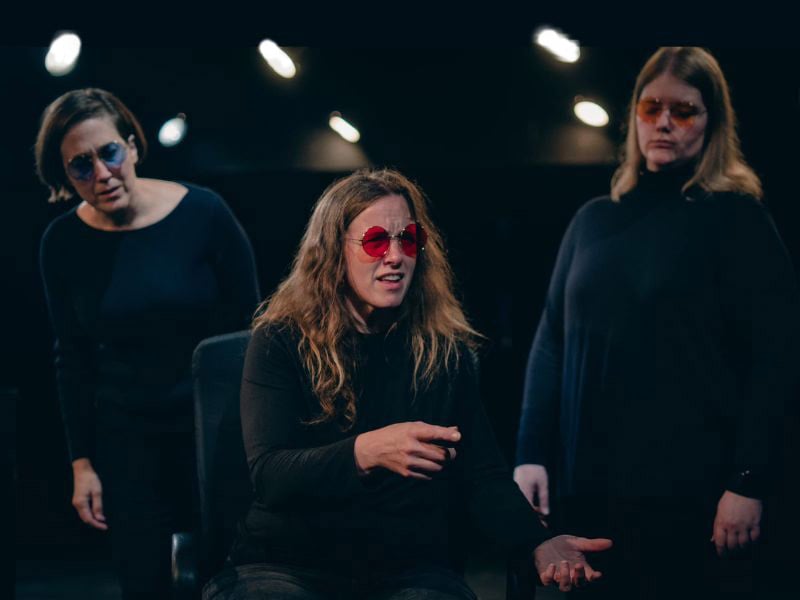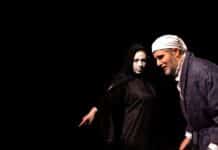I love the learning and growth that comes from a one-act play festival. There is something humbling about seeing a playwright’s work on stage, whether it’s in collaboration or competition with other writers. In a community theater setting, writers get to showcase their work to neighbors, colleagues, and friends. They, along with the community actors and designers, are exposing their hard work and talents to an audience that is there to support and, arguably, enjoy their work. But whether it’s for the first time or the hundredth time, the excitement, the anticipation, and the bravery of bringing a show to the stage remain the same.
Silver Spring Stage’s annual One-Act Festival returns with a collection of plays that showcase emerging and established talents. Eleven one-act plays are performed over the course of two weekends, half performed this past weekend with the rest performing next week. The five productions available the first week ranged from serial killer comedies to fourth wall–breaking film-noir detective stories.

The plays are selected from over 80 community submissions and feature local actors. The variability in talent on the stage is to be expected, but each show has its highlights and stands on its own.
“Tofana Bobana” by Peter Boyer, directed by Lorraine Brooks
Two siblings decide to rent a cabin to murder one of their husbands, in what the program describes as a spoof in which women flip the script on the stereotypical serial killer. Except it’s not clear this is a spoof — they discuss at length well-known female-identifying serial killers while the male character mansplains how women can’t possibly be serial killers. Surprise, the misogynist dies.
The dialogue does not quite explore new topics, even though it had an interesting premise — that of two serial killers on a weekend trip. There was a moment to explore between the two serial killers (why do they kill, how do they decide their tactics, what do they look for in their victims) that could have been much more interesting. Instead we are limited to a plot-hole-heavy act where a hapless man brags about how his wife could never kill him before being killed in the most telegraphed manner possible.
“It Was a Dark and Stormy Night When” by Bohdan Dowhaluk, directed by Caro Dubberly
Well-performed with solid chemistry between the cast, “Dark and Stormy” plays on the film-noir conceit with a detective (Elijah Rakha-Shektoff) who really should get his front door fixed, while Darcy Fowler is the charmingly enigmatic client who comes for assistance with a murder that will take place in what could be a dream, a memory, or just on a theater stage. Dubberly’s direction deftly balances the play’s noir elements with its more absurdist moments, creating a moody yet engaging experience.
Jonathan Blansfield, as the fourth-wall–breaking guide, adds a great deal of charm (even as a dead body) to the cast. “Dark and Stormy” shows that odd and fun can be better than a production that takes itself too seriously.
“The Death of Boson X” by David Malouf, directed by Peter Orvetti
A query delivered by an AI supercomputer in the play, about Puerto Rico being hit by a hurricane, was in offensively poor taste, and overshadowed the play’s successes. This is a line that is unnecessary but for shock value (as demonstrated by the loud, offended gasps from the audience). The same intended message of the story (AI is bad and maybe racist) could have been conveyed without resorting to the low-hanging metaphor at an underrepresented population’s expense.
Which is a pity, because there are some cool design choices throughout and this cast (Melina Gross, Karen Lawrence, Kim Cincotti-Seldon) performs this piece very well, with a relatable ability to bounce off each other’s energy. Kudos to Alayna Theunissen for the delivery of the finale, with an amusing resolution and a reminder why we really shouldn’t worry about an AI takeover.
“Close Inncounters” by Anthony Pezzula, directed by Pauline Griller-Mitchell, assisted by Teresa Gillcrist
Two conspiracy theorists meet at a bed and breakfast to discuss the possibility of alien life on earth. There is a restaurant server who makes fun of them for their beliefs. This cast looks like they had fun working with each other in the production, but the piece resorts to a problematic trope: straw, cartoonish characters, in this case people who fall victim to conspiracy theories. The show goes so far as to costume one with taped glasses. Then lampoons another exhibiting mental health challenges (a moment in the play with no payoff).
The twist reveal at the end doesn’t dissuade from the divisive trope, seeming to address an audience in the same ideological and political bubble for a cheap attack at, well, I’m sure you can guess which political figure.
“Case of the Missing Know-It-All” by Mark Saunders, directed by Yehuda Goldman
Closing out this weekend is this twist on the Sherlock Holmes legacy, focusing on an aging detective in retirement. John Purnell’s portrayal of Mr. Holmes demonstrates that this character may actually be incredibly annoying or grating to his wife and two kids, now that he is home all the time.
Not quite sure the play gave enough credence to this prompt that the kids needed to kill him, but that’s where we find ourselves in the scene. It’s a work that needs polish but works as a fun writing exercise.
____
Silver Spring Stage provides an excellent venue to debut your skills or your work in progress. A cozy stage in the middle of Colesville that offers a really impressive season and comforting space. Given that each festival receives submissions, I encourage new writers with diverse ideas to submit to these types of projects. Because although it never feels good to be told your work is lacking, what’s worse is being told your work might be good. That’s when the real work begins.
Running Time: Two hours including one 15-minute intermission.
The Silver Spring Stage 2024 One-Act Festival plays through August 11, 2024, presented by Silver Spring Stage, 10145 Colesville Road, Silver Spring, MD. Tickets are $25 and can be purchased at the door and online. For more information call (301) 593-6036, visit the website, or email contact@ssstage.org.
The program is online here.



